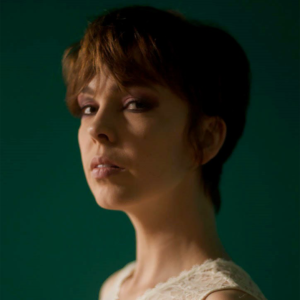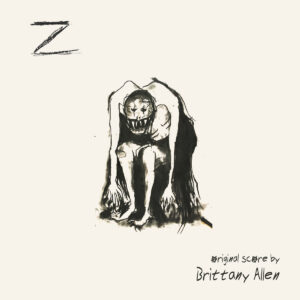Brittany Allen Spotlight: Celebrating Women Composers


Brittany Allen is a composer, producer, songwriter and Emmy-winning actor. Her 2018 debut film score, South by Southwest®’s breakout hit What Keeps You Alive, was named ‘one of the ten best horror films of 2018’ by Rolling Stone Magazine and recently landed in Netflix’s Top Ten. Allen not only composed the score but stars in the film – the third she has made with her partner, filmmaker Colin Minihan.
Her second feature score, Z, premiered on AMC’s Shudder and became one of the top films streamed on the service. More recently, Allen scored the 2020 SXSW short Selfie, which is now in development at Netflix to be turned into a feature. She is set to score the third season of the Netflix and CW show Two Sentence Horror Stories.
Along with her work as a composer, Allen is known for her roles in the horror genre. Most notably, she starred in Lionsgates’ Jigsaw, MGM-owned Orion Pictures’ The Prodigy and Dark Sky Films’ It Stains the Sands Red, which was written and directed by Minihan. In television, she left her mark as Popclaw in Season 1 of Amazon’s hit The Boys, produced by Seth Rogen and Evan Goldberg through their Point Grey Pictures company.
Allen also writes and produces dark pop music under the name Britt.
We reached out to Allen to talk about her new score for Z , released on Lakeshore Records yesterday, her role on Season 1 of The Boys and what’s coming up next for this multitalented artist.
SSM: Z is an awesome horror film about a couple whose 8-year-old son begins seeing an entity in the home. Can you speak a bit about how you created the score?
BA: With ‘Z’, it was important to balance the family drama/ tragedy with the horror. The film deals a lot with very real trauma coming back to haunt a person, and it also looks at the isolation of a mother as she tries to do what’s best for her son, even as he slips further and further away from her. So, firstly my job as a composer is to understand the heart of the story and find a way to connect to it on a personal level. And then it’s about connecting with the director, Brandon Christensen, and getting a feel for the soundscape that he hears the film existing in and having a dialogue where we hopefully find a middle ground between his vision and mine.
Brandon gave me a lot of room to play creatively. He liked the idea of bringing in a classic orchestral sound and I wanted to combine that with dark and distorted and twisted electronic sounds. To bridge the two, I bought a used violin at a flea market and recorded a bunch of takes where I played the ugliest/ most grating sounds I could make, and then those sounds became the basis for a lot of the horror themes.
I work primarily in Ableton, and it gives you a lot of freedom to really rip apart a sound and build something unique, so there was a lot of experimentation to layer and shift and distort the organic violin and have it be the connecting tissue between the strings in the sweeping orchestral movements and the more heavy affected percussive and atmospheric horror.
When I’m building the main themes for the characters and arc of the film, I start with the piano. I approach the material in a similar way that I do as an actor – I lead with my heart and I try to empathize with the characters’ needs and fears and desires, put myself in their shoes, and when I feel like I have a good connection to that deep within, I’ll sit down at the piano and I’ll let my hands guide me. They know where to take me, rhythmically, tempo-wise, and melodically. I’ll put my phone on record and see what I come up with. It’s a pretty magical process, that part of it, and a very exciting moment when you find the notes that properly convey the feeling you’re after.
SSM: I read that ‘Imagination’ was the first track you wrote for Z. Can you speak about your process with creating such a soft track that builds to convey the creative mind of an 8 year old?
BA: I actually wrote ‘Imagination’ as part of a pitch that I built for Brandon prior to getting the job. I made a five minute piece, that started with an early version of ‘Imagination’, then devolved into one of the driving horror themes, and then returned to a more epic and dramatic and dark version of ‘Imagination’ – which eventually became ‘All Is Gone’, the climactic piece at a dark moment in the film.
With ‘Imagination’, I wanted to seduce the audience into feeling safe. The whole crux of the horror is that a child’s imagination can be contorted to something sinister, so my goal was to build some beautiful melodies that captured the innocence of childhood, and that could then be warped and orchestrated differently as the film progressed and the innocence was lost and hijacked by this evil force. That’s something I get a real kick out of, transforming/ deepening the meaning behind a theme throughout the course of a film.
So, you might hear a theme once and feel one way, but then later hear that exact same theme, but there’s a new element to it that gives you a completely different feeling, or points to the loss of that initial feeling. Imagination book ends the film, but by the end, it’s sparse and slow, and resigned and sad, vs at the beginning when it’s full of movement and hope.
SSM: I read in a previous interview that you were terrified to expose yourself in the truest way while shooting What Keeps You Alive, which you also scored. What was the process like with scoring and starring in a film? And how did that play into the development of the score?
BA: “What Keeps You Alive” was the first film I scored, so it was helpful that I had acted in it as well. It gave me a very thorough understanding of the story and the characters, well before scoring – my body had lived through it, so it came fairly naturally to then express what I had experienced, into the score. It took some stepping back when I had to build the music for Jackie (the villain in the film). Because her themes and her rhythms needed to be entirely their own thing, derived from Hannah Emily Anderson’s performance.
To have approached that from the perspective of Jules (the character I played) in the music would have been wrong. So then I had to get into her head. And find her needs, her desires, her feelings – or lack thereof. But again, coming from an acting background, I was able to use the skills I’ve built in that area to sink into Jackie’s essence, really taking all the cues from Anderson, but ultimately with the goal of embodying her mindset so that I could translate that into music. That film is very dear to me since I was with it for so long.
SSM: You won an Emmy Award and more recently starred as Popclaw in Season 1 of Amazon’s The Boys. Can you speak about your transition into working as a composer?
BA: I’ve been a working actor since I was a kid up in Canada. I love acting, and I’ve been fortunate as an actor, but I’ve always felt pulled and inspired by other forms of expression too. It’s pretty rare that a project like “The Boys” or “What Keeps You Alive” comes along, where the thesis of the project speaks to me on a deep level, and where the final outcome is something I really stand behind.
An actor is a pivotal but relatively small piece of the bigger puzzle of filmmaking, and I oftentimes felt hindered by the lack of control over the final product. I studied musical theatre for most of my childhood and during college, so I was trained to understand story through music. And, funnily I see all of that now as the building blocks to me becoming a composer. In musicals, the characters break into song when they are so overcome with emotion that they can’t just speak it. So, I get that. Scoring is the same.
When the emotions get so heightened in a film that music organically has to come in to support that. And as in musicals, characters have themes or melodic voices that are unique depending on who they are and what they’re trying to express. I grew up in love with [Stephen] Sondheim, who is a master at articulating the human experience through music. So I think all of that really forms the basis for how I approach scoring, and why it’s been such a natural transition for me.
SSM: Speaking of The Boys, your death scene was pretty iconic! How was it taking on such an amazing character?
BA: I loved working on “The Boys”. Popclaw is one of the most fun characters I’ve had the chance to play. It was truly an honour to be a part of a project that had so much to say and was not afraid to take a shit on some of the major institutions of society and challenge the status quo in a badass way. I keep hoping that Popclaw has just been cryogenically frozen and will be revived in an upcoming season to take down The Seven. She’s a mess but she’s a killer!
SSM: From singer/songwriter, composer to award-winning actress – what advice can you offer to others with a multiplicity of talents such as yourself?
BA: Don’t be afraid to try new things. And if you are afraid, do it anyway. YouTube tutorials will be your best friend. (Just don’t get sucked into their algorithm and go down an extremist hole). But for real, I’ve taught myself everything so far with music production and scoring, and a lot of what I’ve learned has been from YouTube. The learning curve can be daunting, but if you keep at it, day after day, you will get over the hump. And then you’ll seek out the next hump to get over. And then you’ll realize that’s where the fun is – that the learning never stops and there are so many ways to make music / listen to music / understand music, and it’s just this never-ending adventure.
Also, finish your work. As a creative person who is always bouncing from one idea to another, it’s really important to pick one thing and see it through. Then jump to the next. Sometimes if you try to do it all at once, you end up with a bunch of half-finished projects. But also, different kinds of art can inform each other. I used to think I had to quit acting to become a composer, and though there will be times where I will have to prioritize one over the other, I’ve come to realize that both can complement and inspire each other, and there is no need to put yourself in a box.
SSM: What’s coming up next for you?
BA: I’m about to jump into scoring my first TV show. It’s a great horror anthology originally created by Vera Miao, for CW/Netflix. It’s called “Two Sentence Horror Stories”. I also have an EP under my pop alias “Britt” coming out on vinyl through Burning Witches Records. It’s called Khamai Lion and it will be out before the end of the year.
Soundtrack Available Now: [Download/Listen]





